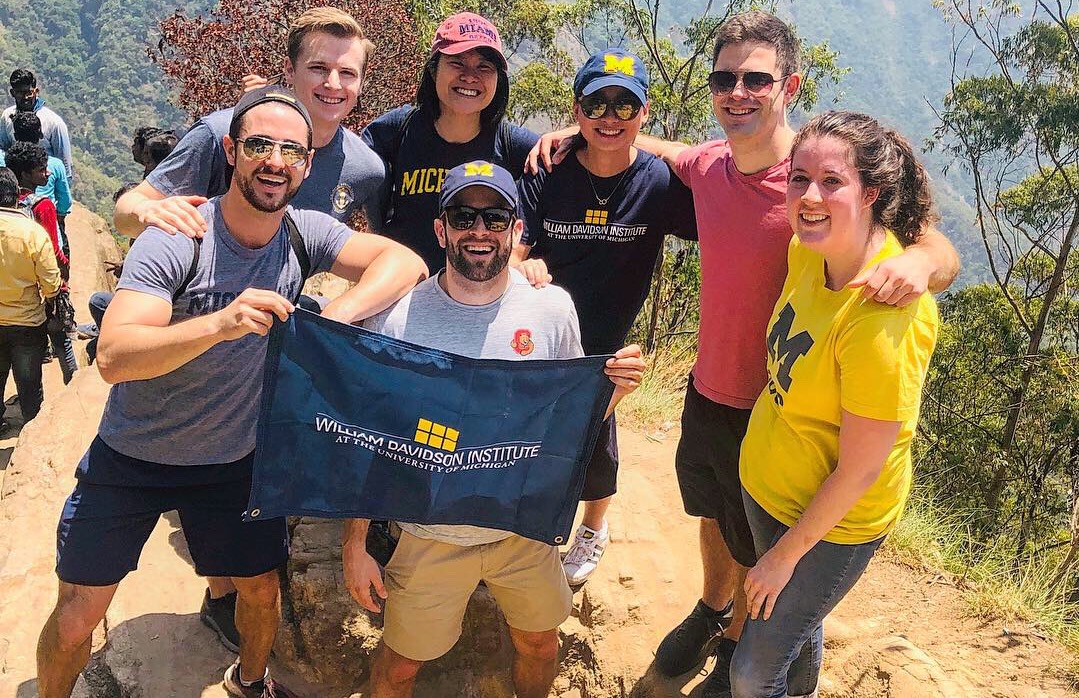
Since its founding, WDI has played an important role in providing University of Michigan graduate students with international experiences by funding summer internships, sponsoring student MBA teams and organizing travel-study courses abroad.
Over the years, some students have participated in multiple WDI programs and projects. To recognize this commitment by students to WDI’s mission to “equip economic decision makers in emerging countries with the tools of commercial success,” the Institute has established the Davidson Field Scholars program.

The Davidson Field Scholars program recognizes the important role these students play in WDI’s partnerships.
—Paul Clyde, President of WDI
“We wanted a way to acknowledge this commitment by a special group of U-M graduate students who work with WDI in addressing the business challenges faced by our partner companies and organizations operating in low- and middle-income countries,” WDI President Paul Clyde said. “The Davidson Field Scholars program recognizes the important role these students play in WDI’s partnerships.”
The Davidson Field Scholars program is open to all U-M graduate students. Applicants must complete participation in one WDI-sponsored program and commit to completing a second before they are eligible to apply.
Monika Johnson, who spent a year helping establish the University of Michigan International Investment Fund (IIF), was named one of two inaugural Davidson Field Scholars. Johnson, who received her MBA and MS in 2019, studied international development as an undergraduate student. After graduating from U-M’s Ross School of Business, her goal was to return to emerging markets in some capacity.
“Building the International Investment Fund helped me solidify how I might be able to combine my interest in finance and passion for economic empowerment,” she said. “As I seek to do this professionally down the road, being a Davidson Field Scholar will help me articulate my experience to others more formally.”
The other inaugural Davidson Field Scholar, Caroline Lucas, was Johnson’s partner on the IIF project. She called the work on the investment fund “a transformational learning experience.”
“It was truly collaborative, entrepreneurial, analytical and creative,” she said. “It was very exciting to be essentially given a mission to build an investment fund in India and a blank slate.”
Lucas said she is very passionate about international development and chose U-M for her graduate studies partly because of WDI’s work in the field. While working to create the IIF, Lucas and Johnson worked with Clyde and Ross Professor Gautam Kaul. The students also provided guidance to a WDI-sponsored MAP team in its due diligence of four Indian companies for possible investment from the fund. MAP, or Multidisciplinary Action Program, is an action-based learning course in which MBA students receive guidance from faculty advisors from Ross and WDI. Each project requires analytical rigor, critical thinking and teamwork. (Find out more about WDI’s MAP projects over the years here.)
“We spent hours working together on this project and the Davidson Field Scholar program was a great way to formally recognize all of the work we did together,” said Lucas, who will soon start a job as a senior strategy consultant at Accenture Strategy. “Since I plan to pursue international development long-term, having a formal way to recognize my research with WDI is an invaluable asset to my resume.”
Lucas said she plans to keep in touch with the student leadership at the IIF “as the team works its way towards our first investment.”
Likewise, Johnson, who starts in a finance leadership development program with E&J Gallo winery in August, sees the growing Davidson Field Scholars community as a valuable network for MBA graduates looking to have an impact in low- and middle-income countries.
“I am looking forward to keeping in touch with the incoming International Investment Fund leadership and others involved with WDI,” she said.
Click here to see an a regularly updated list of Davidson Field Scholars.
Teams have been working with LvBS Consulting to develop a consulting program focused on marketing. Specifically, a survey tool is being developed to help identify areas in which the clients can focus their efforts, and training materials have been identified to help educate clients in specific areas of marketing.
For the past three years, WDI has been working in partnership with the Center for Private Enterprise (CIPE) to develop curriculum and instructional materials to be introduced at universities in Papua New Guinea. Initially, the project supported three PNG universities; a fourth was added in 2018 — the Institute of Business Studies University (IBSU). WDI Faculty Affiliate Julie Felker took her fifth visit to Port Moresby in November 2019 to run a workshop on entrepreneurship and advise the four universities on next steps in their entrepreneurship course development.
WDI is working with the Center for International Private Enterprise (CIPE) to develop curriculum and teachers’ guides for a training program on access to finance for entrepreneurs in Algeria. Working closely with WDI staff, a WDI consultant is developing modules in the areas of financing fundamentals, financial management for growth, creating business plans and business pitching. WDI’s curricular modules will be used by local trainers in Algeria in a four-day interactive course targeted at owners of fast-growing, small- and medium-sized enterprises.
WDI is a collaborative, multi-disciplinary organization. As a result, it often engages multiple sector and services teams in our work. The following project undertaken by both our Education sector and Performance Measurement and Improvement service demonstrates our holistic approach. The Education sector implemented Business & Culture: A Virtual Practicum — a classroom-to-classroom, action-learning course on international business cultures that brings together undergraduate students from Egypt, Libya and the U.S., supported by the Stevens Initiative. The course ran five times at the Ross School of Business, starting in Winter 2020. Participants attended lectures by international faculty, worked on interregional teams through synchronous and asynchronous exchange, employed field research methods to learn about one another’s business cultures and created a final project that captured their cross-cultural learnings. The program equipped young people in the U.S. and MENA region with the necessary competencies to communicate, problem-solve and collaborate in a global team environment—all essential 21st century skills in an interconnected world. The Education sector collaborated with the Performance Measurement and Improvement service, which led the design and implementation of an impact evaluation of the program on students in the U.S., Libya, Lebanon and Egypt. In addition to assessing the impact of the program on student outcomes (e.g. empathy, cross-cultural communication skills, business skills and knowledge), the data was used to improve the course and develop generalizable knowledge on how to increase the impact of virtual exchange courses.
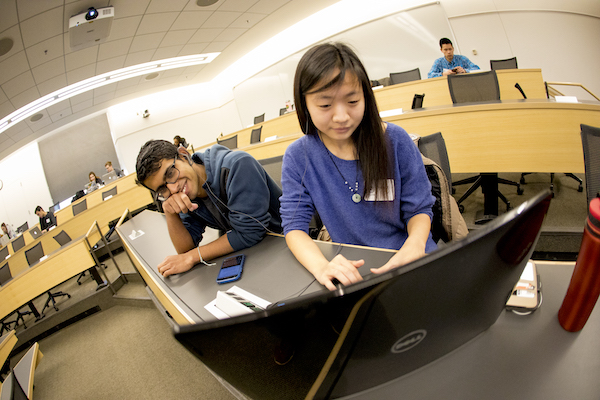
Students video chat with their overseas counterparts as part of the MENA-Michigan Initiative for Global Action Through Entrepreneurship (M²GATE) program in 2018.
Ann Arbor and Washington, D.C., April 24, 2019 – Today, the Stevens Initiative announced funding for Business & Culture: A Virtual Practicum implemented by the William Davidson Institute at the University of Michigan (WDI). Business & Culture is one of six programs selected through an international competition to fund virtual exchange programs in the United States and the Middle East and North Africa (MENA).
WDI is part of the third round of Stevens Initiative grantees. These exchanges will enable thousands of young people to gain the skills that they need to succeed in today’s economy and society, and to establish new cross-cultural connections.
Implemented by WDI, under the Stevens Initiative, Business & Culture: A Virtual Practicum is a classroom-to-classroom, action-learning course on international business cultures that brings together students from Egypt, Lebanon, Libya and the U.S. Participants will attend synchronous lectures by international faculty, work on interregional teams using synchronous and asynchronous methods, employ field research methods to learn about one another’s business cultures, and create a final project that captures their cross-cultural learnings. The program will equip young people in the U.S. and MENA region with the competencies they need to communicate, problem-solve, and collaborate in a global team environment—all essential 21st century skills in an interconnected world.
“This grant enables us to offer a unique course bringing together students in the U.S. and MENA and provide them significant opportunities for cross-cultural learning and collaboration,” said Amy Gillett, WDI’s Vice President of Education and Academic Director of Business & Culture. “This is not just a course—it’s a game changer. We believe it will significantly enhance participants’ ability to be effective global business leaders in the future.”
From 2017-19, WDI managed the MENA-Michigan Initiative for Global Action Through Entrepreneurship (M²GATE). Also funded by the Stevens Initiative, the M²GATE program brought together more than 400 students from five Michigan university campuses and their peers in Egypt, Libya, Morocco and Tunisia. Harnessing the power of virtual exchange, students collaborated to find entrepreneurial solutions to social challenges in the Middle East and North Africa (MENA) region, while learning new skills, building cross-cultural experiences and forging new relationships. More details on the program are available in a recently published impact report.
“I am very pleased with the grants that we are awarding for the next round of Stevens Initiative funded virtual exchange programs,” said Marie Royce, Assistant Secretary of State for Educational and Cultural Affairs, U.S. Department of State. “As bandwidths increase and platforms get more sophisticated, virtual exchanges open opportunities for international exposure and connection to hundreds of thousands – and potentially millions – of people. Virtual exchanges like those funded by the Stevens Initiative also facilitate cross-cultural experiences and build career readiness skills. I look forward to a great expansion of this innovative program over the next year and continuing to honor this living legacy to Ambassador J. Christopher Stevens.”
Through the work of these new programs, the Stevens Initiative will expand its reach to nearly 40,000 students in 15 MENA countries and the Palestinian Territories, and in 44 U.S. states, Puerto Rico, and Washington, DC. Programs will begin this April and will continue through the summer of 2021.
Other programs include:
“The Aspen Institute values the open exchange of ideas and the work of the Stevens Initiative allows for just that,” said Elliot Gerson, Executive Vice President of Public & Policy Programs at the Aspen Institute. “Through virtual exchange, youth in the US and MENA region are able to engage with one another, learn together, and become global-minded leaders.”
Created in 2015 by the Stevens family as a living legacy to Ambassador J. Christopher Stevens, the Stevens Initiative is a public-private partnership that is building global competencies and 21st century skills for young people in the United States and the Middle East and North Africa. Through virtual exchange, the Initiative connects youth through technology to collaborate and learn together, giving them access to a substantive international exchange.
The Initiative is awarding these six grants to schools and organizations to implement virtual exchange programs, lasting from several weeks to several months, for students from middle schools, high schools, colleges, and universities.
Located at the University of Michigan, WDI is an independent, non-profit research and educational organization guided by its founding principle that thriving businesses drive economic development and improve social welfare in low- and middle-income countries.
Business & Culture is funded by the Stevens Initiative, which is sponsored by the U.S. Department of State with funding provided by the U.S. Government and is administered by the Aspen Institute. It is also supported by the Bezos Family Foundation and the governments of Morocco and the United Arab Emirates.
The U.S. Department of State’s Bureau of Educational and Cultural Affairs (ECA) builds relations between the people of the United States and the people of other countries through academic, cultural, sports, professional and private exchanges, as well as public-private partnerships and mentoring programs. These exchange programs improve foreign relations and strengthen the national security of the United States, support U.S. international leadership, and provide a broad range of domestic benefits by helping break down barriers that often divide us. Visit eca.state.gov.
The Aspen Institute is an educational and policy studies organization based in Washington, DC. Its mission is to foster leadership based on enduring values and to provide a nonpartisan venue for dealing with critical issues. The Institute is based in Washington, D.C.; Aspen, Colorado; and on the Wye River on Maryland’s Eastern Shore. It also has offices in New York City and an international network of partners. For more information, visit www.aspeninstitute.org.
The Bezos Family Foundation supports rigorous, inspired learning environments for young people, from birth through high school, to put their education into action. Through investments in research, public awareness, systems building and programs, the foundation works to elevate the field of education and improve life outcomes for all children.
The Embassy of the United Arab Emirates (UAE) in Washington, D.C. is committed to promoting and increasing cross-cultural understanding and educational exchanges. In line with the UAE Government’s values, the Embassy supports educational programming at schools and universities across the U.S. The Embassy works with U.S. institutions to provide unique opportunities for peer-to-peer exchanges and help broaden student’s horizons.
The Kingdom of Morocco has held a longstanding commitment to the promotion of peace, mutual understanding and respect across all fora. In line with this commitment, the Government of the Kingdom of Morocco is a strong supporter of the Stevens Initiative and is proud to be included in its programs, which foster opportunities for cross-cultural exchanges between youth.
Scott Anderson, Communications Manager–WDI. seander@umich.edu
Jon Purves, Senior Media Relations Associate, The Aspen Institute. Jon.Purves@aspeninstitute.org
Rasheeda Clements, Public Affairs Specialist, U.S. Department of State. ECA-Press@state.gov

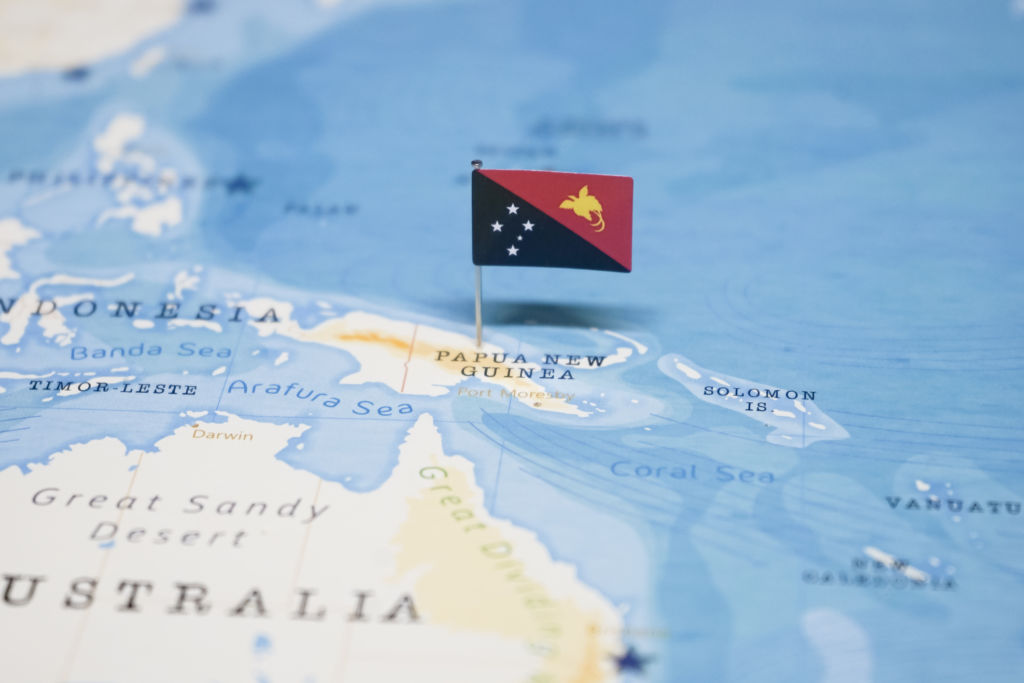
When leaders at Pacific Adventist University (PAU), based in Papua New Guinea, wanted to add more entrepreneurship undergraduate courses last year, it turned to WDI’s Education team and its Entrepreneurship Development Center for help developing and evaluating the new curriculum. A month ago, PAU debuted its new double major in accounting and entrepreneurship.
Twenty-six students have enrolled in the first course – Principles of Entrepreneurship. PAU also is offering an entrepreneurship diploma program at its affiliate campus, Sonoma Adventist College, and has 20 students enrolled in the first course. The course is a mix of online learning and on-campus instruction.
WDI Faculty Affiliate Julie Felker has worked with the school from the start, suggesting course offerings and providing feedback to faculty, which developed the curriculum drafts. She said the PAU faculty and administration should be lauded for their efforts.
“PAU far exceeded expectations in getting not one, but two entrepreneurship degree programs off the ground,” she said. “They really should be commended for their dedication and hard work in seeing this initiative through. (Business School) Dean Khin Maung Kyi and the faculty were personally committed to the project, and that’s why it succeeded.”
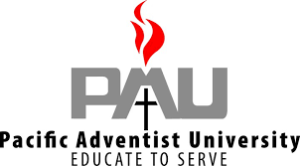
Since 2016, WDI has been supporting the Center for International Private Enterprise (CIPE) to build capacity in entrepreneurship education at PAU and other universities in Papua New Guinea (PNG).
A long-term goal of the work in PNG is to help the country grow its small- and medium-sized business sector and diversify the economy away from reliance on mineral resources. WDI and CIPE, through its work, want to change the mindset of business school students who usually find public service jobs or traditional professions. Instead, educators want students to cultivate an entrepreneurial mindset in which they are employers, not employees, Felker said.
“In partnership with the William Davidson Institute, CIPE’s work to create and improve entrepreneurship curricula in PNG universities has made significant contributions in paving entrepreneurship as a viable career path to young Papua New Guineans,” said Sarah Yun, a program officer for Asia and The Pacific for CIPE. “WDI’s expertise in entrepreneurship pedagogy has been invaluable throughout this journey.”
Felker is scheduled to make two consulting trips to PNG in the near future. This summer, she will deliver a training program related to entrepreneurship to faculty and administrators at PAU and three other universities also working with CIPE and WDI. The training topic will be determined after consulting with the four universities to assess their needs and interests.
WDI has been working with CIPE to enhance an entrepreneurship and civic participation training program in North Macedonia targeting recent university graduates (21-26 years old). In the most recent and final phase of this engagement, a WDI consultant provided feedback on the entrepreneurship curriculum, and contributed training materials on customer discovery and lean startup. f
While in Skopje, YEF invited WDI Faculty Affiliate Stephen Brand and WDI Senior Project Manager Kristin Kelterborn to be guests on their podcast, “Skills That Pay the Bills.”
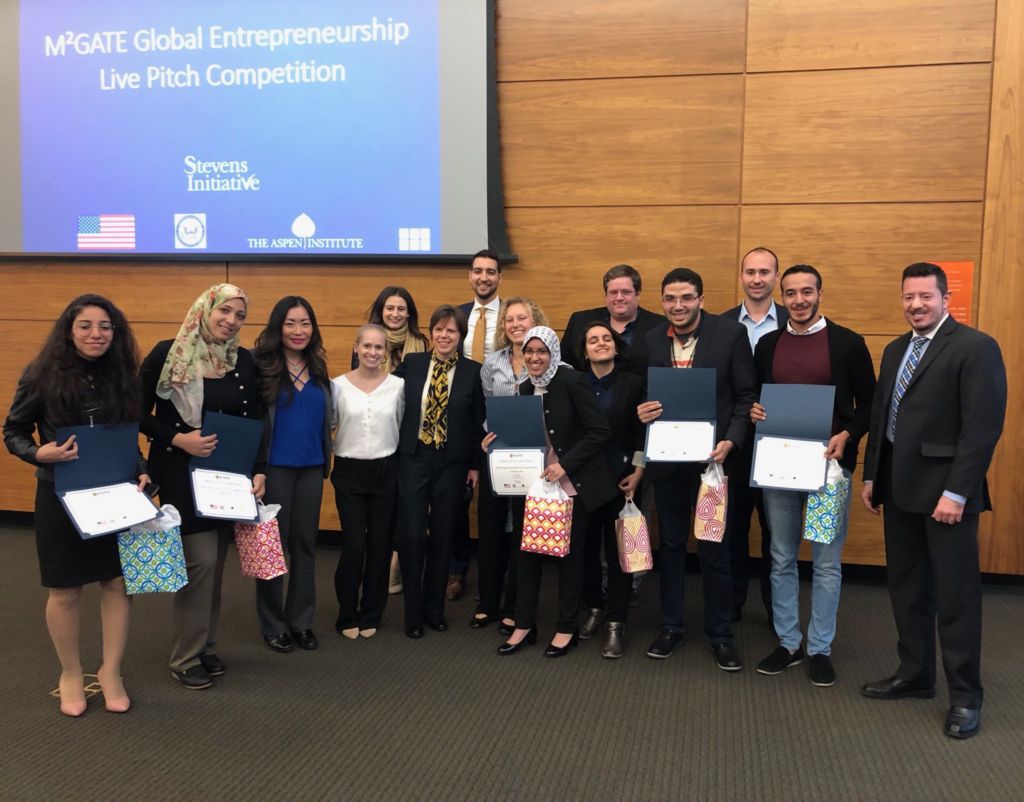 WDI designed an innovative virtual exchange program using modern technologies to give students an exciting real-world learning experience.
WDI designed an innovative virtual exchange program using modern technologies to give students an exciting real-world learning experience.
The latest WDI Impact Report, “Building Bridges Through Virtual Collaboration,” chronicles how WDI utilized the latest virtual learning tools to bridge the gap between countries, communities and cultures and bring students together solve real-world problems while also honing the 21st century skills they need to excel in the modern workplace. (You can read a “flip book” version of the report here.)
The MENA-Michigan Initiative for Global Action Through Entrepreneurship program – M²GATE for short – brought together more than 400 students from five Michigan university campuses and their peers in Egypt, Libya, Morocco and Tunisia to find entrepreneurial solutions to social challenges in the Middle East and North Africa (MENA) region.
“M²GATE graduated more than 400 students in five countries and deeply touched their lives,” said Amy Gillett, vice president of Education at WDI and academic director of M²GATE. “For many, the program was transformative. The impact report explores this in detail and serves as a valuable resource for other institutions contemplating a virtual exchange.”
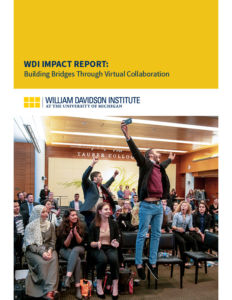 For the program, all teams worked virtually to develop social entrepreneurship projects and accompanying pitches over an eight-week period with the help of instructors, mentors, and successful entrepreneurs from MENA and Michigan. WDI believes entrepreneurship is a crucial catalyst of economic growth and an effective way to cure society’s ills, which is why it was the focus of the program.
For the program, all teams worked virtually to develop social entrepreneurship projects and accompanying pitches over an eight-week period with the help of instructors, mentors, and successful entrepreneurs from MENA and Michigan. WDI believes entrepreneurship is a crucial catalyst of economic growth and an effective way to cure society’s ills, which is why it was the focus of the program.
At the end of each of the three cohorts, the program hosted a virtual competition with judges naming winners based on scalable solutions. The winning team from each cohort then participated in a Nov. 14 pitch competition at the University of Michigan.
M2GATE is supported by theStevens Initiative, which is sponsored by the US Department of State and administered by the Aspen Institute. The Stevens Initiative is also supported by the Bezos Family Foundation and the governments of Morocco and the United Arab Emirates.
“The Stevens Initiative’s virtual exchange programs foster meaningful cross-cultural interactions and relationships while also honoring the legacy of Ambassador Stevens,” Gillett said. “We were privileged to play a role in advancing this mission with the M²GATE program. ”
This is the third impact report in an ongoing series that detail the long-term impact WDI is having in certain sectors or geographies. The first WDI Impact Report, “Improving Business Education in the Philippines,” examined the Institute’s contributions to the five-year STRIDE project that focused on strengthening the science, technology, research and innovation capacity on the island nation.
The second WDI Impact Report, “Positive Change Through Actionable Metrics,” followed the work of the Institute’s Performance Measurement & Improvement group while pilot-testing a new framework in Brazil, Nicaragua and Peru designed to increase the impact of small, inclusive businesses and their distribution networks.
View the eBook Download the PDF
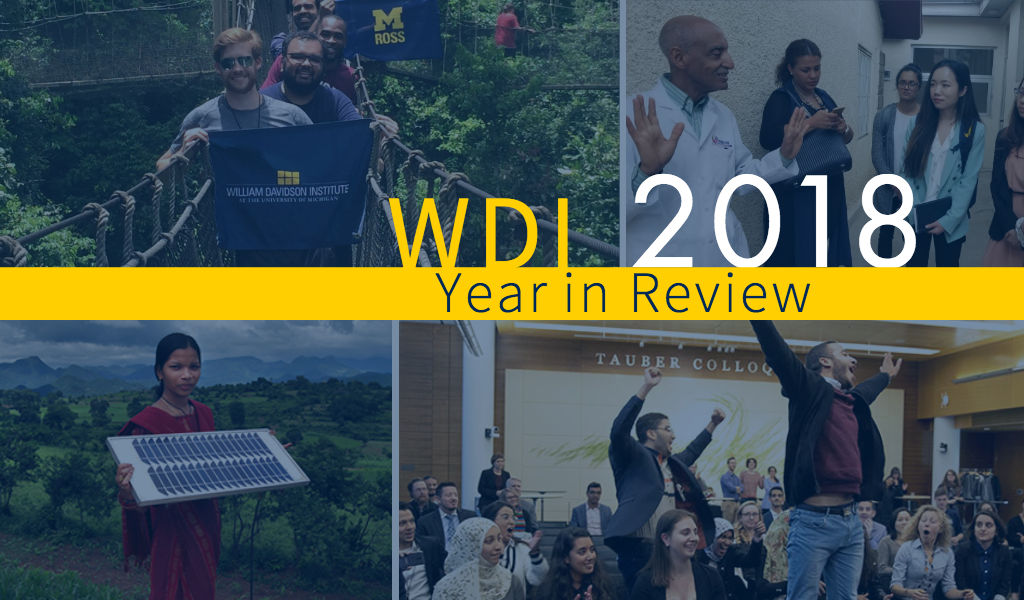
Improving reproductive health supply chains to boost access to family planning products in Mozambique. Educating senior managers from around the Baltics. Helping both investors and enterprises they support better measure impact in Latin America. Creating new MBA-level curriculum for universities in Papua New Guinea.
These partner projects are just a few examples of the work WDI performed around the world in 2018. Working with a robust set of private sector and nonprofit partners on a diverse number of projects, WDI effectively applied business skills in low- and middle-income countries (LMICs) in impactful ways.
In all, WDI teams worked on more than 40 projects with more than 40 partners in more than 40 countries this past year that focused on our core consulting sectors—education, energy, finance and healthcare, as well as our management education programs, entrepreneurship development, measurement and evaluation services and the deployment of University of Michigan graduate students around the world.
“In 2018, I was impressed by the degree to which the Institute integrated the energy and talents of our staff, University of Michigan students and faculty leaders to address multiple challenges facing for-profit and non-profit organizations,” said WDI President Paul Clyde. “While most of these projects were in one of our key focus areas—Energy, Healthcare, Management education or Finance—many drew on expertise that cut across sectors or disciplines to deliver more complete solutions.”
WDI’s project work leveraged the knowledge and expertise of the Institute’s staff, its research fellows and faculty from the University of Michigan and other world-class higher education institutions to develop business solutions in LMICs. Additionally, WDI disseminated what it learned doing work in the field through published research reports, academic journal articles and notable blog posts. The Institute also contributed to U-M student and faculty enrichment by hosting several compelling speakers at the Ann Arbor campus.

Members of the LIFE project consortium visit a produce stand in Turkey and interviews the owner on how a green grocer sources his produce and his perspective on how he could potentially benefit from the LIFE Food Enterprise Center.
Our work in 2018 spanned the globe and included projects on a wide variety of topics and issues. Among the work, WDI launched a new consulting focus area in the energy sector, connected hundreds of students using virtual technology, developed a model to train nurses for a planned hospital in Ethiopia and trained refugees in the food industry in Turkey. Here are a few highlights from our project work this past year.
Throughout the past year, WDI has widely shared its research and field work a to a broader audience through a number of publications and online journals.
“Participating in the project to test the framework provided us a holistic understanding of poverty. WDI gave us the tools to guide decision-making and track progress towards broader development goals through data collection and analysis.”
—Mónica Varela, director of impact for the Clinton Giustra Enterprise Partnership
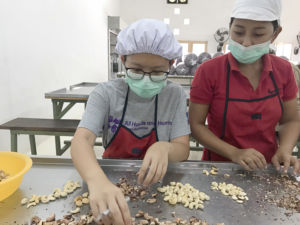
WDI intern Nadia Putri (pictured left)
A number of WDI employees penned blogs on their work or trends impacting their research that appeared on the Institute’s website.
In 2018, WDI hosted speakers as part of the the Institute’s Global Impact Speaker Series. While on campus, many of the speakers sat down for one-on-one interviews.